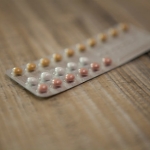Current research suggests that women with premenstrual dysphoric disorder (PMDD) have an abnormal affective response to normal hormonal shifts that occur during the menstrual cycle. Some researchers have hypothesized a metabolite of progesterone (PROG), allopregnanolone (ALLO), may mediate this sensitivity. In rodents, exposure to or withdrawal from ALLO modulates GABA-A receptors and, in this way, affects brain excitability and anxiety-like behaviors.
Women with PMDD do not appear to have abnormal plasma levels of ALLO; however, the emergence of PMDD symptoms could reflect a sensitivity to changing levels of ALLO occurring during the luteal phase of the cycle.
A recent study examined the effects of administering dutasteride (DUT), a blocker of 5 alpha reductase (type 1 & 2), the enzyme responsible for the conversion of PROG to ALLO. DUT prevents the increase in ALLO levels which normally occurs during the luteal phase.
Women with PMDD (n=16) and a group of asymptomatic controls (n=16) were recruited (mean [SD] ages = 41.8 [6.1], 41.5 [4.8] years, respectively) and enrolled in a double-blind, placebo-controlled, cross-over trial of DUT, which was conducted over two menstrual cycles.
Subjects were further subdivided and received either low dose DUT (LD = 0.5mg/day) or high dose (HD = 2.5mg/day).
Women with PMDD receiving LD DUT (n=8) experienced no beneficial effects of DUT treatment compared with either baseline or placebo conditions – all women continued to meet criteria for PMDD.
In contrast, women receiving HD DUT (n=8) reported significantly decreased luteal phase symptom scores (i.e., irritability, anxiety, sadness, breast pain, bloating, and food cravings) compared with both baseline and placebo conditions. Seven of these eight women no longer met criteria for PMDD.
Both doses of DUT were well-tolerated in both the women with PMDD and the asymptomatic controls.
This pilot study suggests that DUT at 2.5 mg per day effectively treats both affective and physical symptoms of PMDD. This dose (but not the lower dose of DUT) prevented the increase in ALLO levels occurring during the luteal phase.
Although this small study is preliminary and requires replication in a larger sample, it is exciting. It points to a novel strategy for managing PMDD symptoms and may ultimately lead to a better understanding of what exactly causes PMDD.
Note: Dutasteride is marketed as Avodart for the treatment of benign prostatic hyperplasia (BPH).
Ruta Nonacs, MD PhD








Leave A Comment